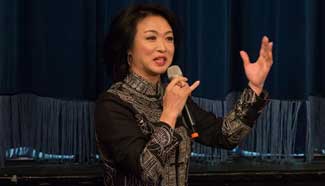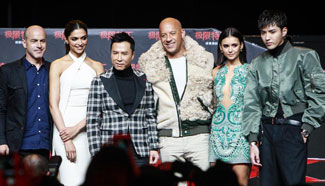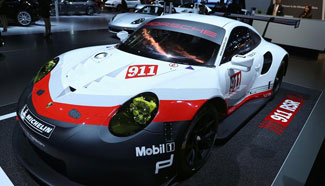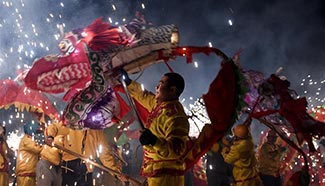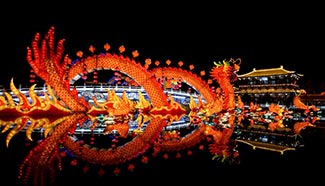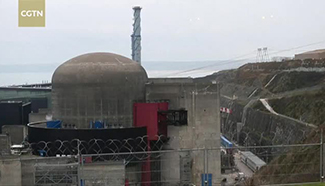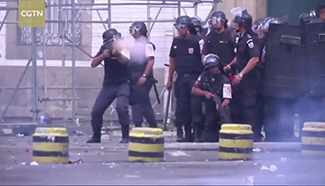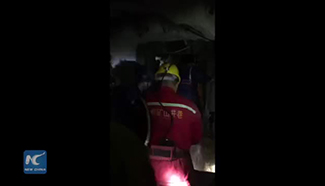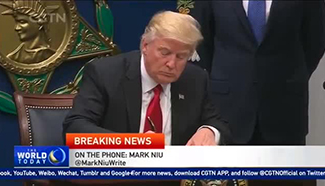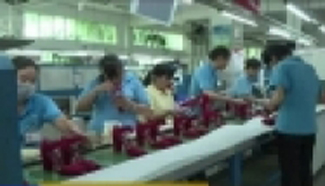by Levi Parsons
SYDNEY, Feb. 10 (Xinhua) -- With uncertainty surrounding a number of political and financial risk events during 2017, the world's economy appears precariously placed.
Upcoming elections in the Eurozone, along with Brexit negotiations, ongoing war in the Middle East and the unpredictability of the Trump White House, make 2017 seem like difficult waters to navigate for anyone involved in trade.
But the chief executive officer of Australia's Fortescue Metals, the fourth largest Iron ore producer in the world, sees things differently and expects China's economy to continue to grow.
"I leave politics for the politicians, I'm a simple businessman," Nev Power told Xinhua. "China has very important trade relationships and ultimately I think those are the things that are going to prevail."
"From a business perspective, our relationship with China has been a very successful bilateral relationship over many years and has continued to develop and is important to both countries," he added.
China's need for steel is remains high, particularly in the central and western provinces where urbanization and industrialization is rapidly growing.
"We've seen continued steel demand in China at around 800 million tons per year, which is a very strong market. 50 percent of world steel production comes from China," Power said.
But over the past few years, the government has cracked down on the steel manufacturing industry, as a part of China's "war on pollution."
It's estimated that around 4-5 percent of the industry will be affected, however this tighter regulation has been welcomed by Fortescue.
"I believe the recent crackdown has been on very small and in most cases illegal production which is impacting on the steel industry because they are highly polluting and highly inefficient, so by removing those production sources there will be extra volume for the large integrated steel mills and that will provide greater levels of efficiency and of course cleaner production," Power said.
As the lowest cost iron ore producer in the world, Fortescue spends around 12.5 Australian dollars (9.5 U.S. dollars) in generating a ton of the commodity and with the help of China Development Bank in 2016, that number is expected to further decrease after the company obtained a 473-million-U.S. dollar loan in order to finance a new fleet of eight iron ore carrier ships.
The groundbreaking deal was the largest ever issued to a foreign company by a Chinese Bank.
"The first ship is running better than expected. It's very fuel efficient which is the most important thing because we want to be able to provide the most efficient supply chain and pass that low cost onto our customers, so that they in turn are more efficient in their production," Power said.
"We are very pleased to be able to do business with Chinese shipyards, particularly in a time when business is very tough for them, so we've been able to provide some increased demand for them. So it's a good two-way relationship."
This is not the first time Chinese financial support has buoyed the exporter.
"We have very strong Chinese investment in Fortescue with the Hunan Valin Group holding around 15 percent of our stock. That has been one of the most successful investments by a Chinese steel company," Power said.
Power is a big believer in foreign investment and encourages China and Australia to seek further connections in business and relations.
"In addition to raw material, increasingly there are opportunities in agriculture, tourism and there are a lot of families travelling back and forward between Australia and China," he said.
"We are seeing increased air links and communication links which I see as a very strong positive."
The changing tides of politics around the world at the moment has appeared to unsettle those looking to invest, but politics aside, the volatility of iron ore prices alone have been enough to rattle the industry in recent years.
During Australia's mining boom in 2011 the price of iron ore reached a high of 187 U.S. dollars per ton, but as growth in China's construction sector began to stabilise, the cost of the commodity had fallen to just 38 U.S. dollars per ton in 2015.
Over-production and stockpiling of the resource were to blame and although the price of iron ore has rebounded and stabilized at just over 80 U.S. dollars, pitfalls for producers wait at every turn.
But the mining group has worked to keep their Pilbara operations protected from upheaval in the market.
"The iron ore market is very difficult to predict in terms of price, but if we look at the underlying supply and demand it's been pretty much in balance for the last 18 months of so," Power said.
"Fortescue is in very good shape financially and we have been focused on improving the productivity and efficiency of our business."
The company have positioned themselves strongly in 2017 and despite global uncertainty, Power predicts the world will follow suit.
"The world economy has been slowed to recover from the global financial crisis, in Europe we are starting to see signs of growth, Asia is continuing to grow strongly and going forward this year there seems to be signs that economic growth is starting to become stronger right across the world," he said.

